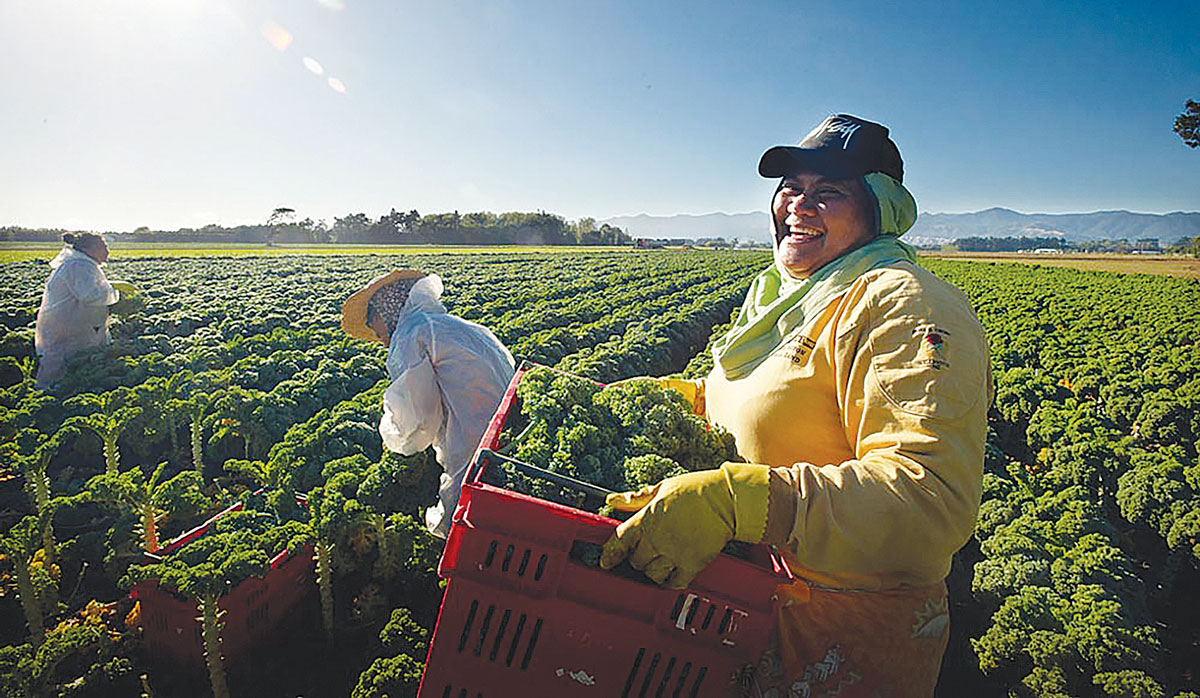Consistency needed over regulations
One of NZ's largest commercial vegetable growers says NZ can't have piecemeal regulations that differ from region to region.
Growing fruit and vegetables contributes to New Zealand's agricultural greenhouse gas emissions. At Woodhaven Gardens, near Levin, Jay Clarke and his family have been figuring out how to reduce their impact on the climate.
Woodhaven Gardens was established by the Clarke family in 1978 on the fertile plains of the Horowhenua region.
The farm now grows 24 different vegetable crops across more than 1,800 hectares. It employs around 250 staff and, annually, the business sells 27 million individual vegetable units – about 10% of the national supply.
“Vegetable growing is a complex undertaking, whether you’re doing it for one crop or 24,” explains Jay, son of Woodhaven’s founders John and Honora Clarke. “Our business isn’t one single farm; it’s spread out over 127 paddocks with 50 kilometres between the most northern and southern properties.”
He adds that in order to understand their environmental impact, they’ve had to get to know all those paddocks individually.
Like many vegetable growers, the Clarke family didn’t know anything about agricultural greenhouse gas emissions when they started out. However, achieving good outcomes for their business, their community and the environment has always been front and centre.
The Clarke’s journey to understanding their emissions began when they were looking at ways to reduce nutrient leaching. They were approached by scientists at Massey University who helped them understand the impact of nitrogen fertiliser not only on freshwater, but also on the climate.
Nitrous oxide is a potent and long-lived greenhouse gas that comes from a range of sources, including farming. In agriculture, it is emitted into the atmosphere when microorganisms in the soil act on nitrogen introduced either by animal urine or dung, legume plants or nitrogen-based fertilisers. Methane is another powerful greenhouse gas emitted from farming livestock. But for most horticulture growers, the focus is on nitrous oxide emissions from nitrogen fertiliser use.
“Figuring that out was actually really helpful for us because it meant we were getting a twopronged approach,” says Jay Clarke. “We were already looking at nitrogen for freshwater quality. By tackling that, we’ve also been able to lower our greenhouse gas emissions.”
For horticulture producers like the Clarkes, greenhouse gas emissions are directly linked to nitrogen fertiliser use. A small amount of carbon dioxide is also emitted from lime or dolomite use.
Horticulture New Zealand and MPI have developed a simple Excel spreadsheet that calculates the emissions from a horticultural operation.
 |
|---|
|
Woodhaven Gardens grows over 21 types of vegetables. |
Monitoring and Measuring
In 2019/20, Woodhaven Gardens emitted 588 tonnes of nitrous oxide, expressed as ‘carbon dioxide-equivalent’ – just under half what was emitted two years prior.
That is the equivalent of taking over 300 cars off the road.
Jay Clarke says the team at Woodhaven Gardens works hard to produce the most amount of food for the least amount of fertiliser.
Here are the main things they’ve been doing to manage their nitrogen use:
- Developed expertise in the crops they grow - understanding each one’s growth cycle and fertiliser requirements.
- Regular soil testing (via a Nitrate Quick test) to find out how much nitrogen is already in the root zone.
- Investment in precision agriculture systems to ensure fertiliser is applied exactly where it is needed and tight to the root zone, at the right rate and the right time.
“We GPS’ed our tractors so we know that our inputs go exactly where we want them to, and we don’t get fertiliser in the parts of the farm that don’t need it,” Clarke says.
The team at Woodhaven also pay attention to the health of the soil, using crop rotation and cover crops to further minimise the need for fertiliser.
“I never thought we’d get as far as this,” adds Clarke. “But by changing a whole lot of little things, and being willing to try different things, we’ve been able to add it all up and have a major impact. It’s something we’re really proud of.”
He says they are continuing to learn as they go and there are still parts of the system that need work. This includes monitoring whether new, lower levels of fertiliser are sustainable across all seasons in the longer term.
Reproduced courtesy of: www.agmatters.co.nz
Could a breakthrough in fermentation create a new multi-million-dollar export market for shiitake mushroom extracts into China?
Meadow Fresh has created the world's first fantasy sports league powered by real cows.
This year, 'Foodie February' sees potatoes take the spotlight as one of New Zealand's most powerful and versatile food heroes.
A multi-cultural team is helping to establish one of New Zealand's largest plantings of premium eating grapes - while learning each other's languages and cultures along the way.
The World Wide Sires National All Day Breeds Best Youth Camp Best All Rounder plaudit has become family affair, with 2026 Paramount Cup winner Holly Williams following in her sister Zara's footsteps.
DairyNZ is giving New Zealand farmers a unique opportunity to gain hands-on governance and leadership experience within the dairy sector.

OPINION: Meanwhile, red blooded Northland politician Matua Shane Jones has provided one of the most telling quotes of the year…
OPINION: This old mutt has been around for a few years now and it seems these ‘once in 100-year’ weather…